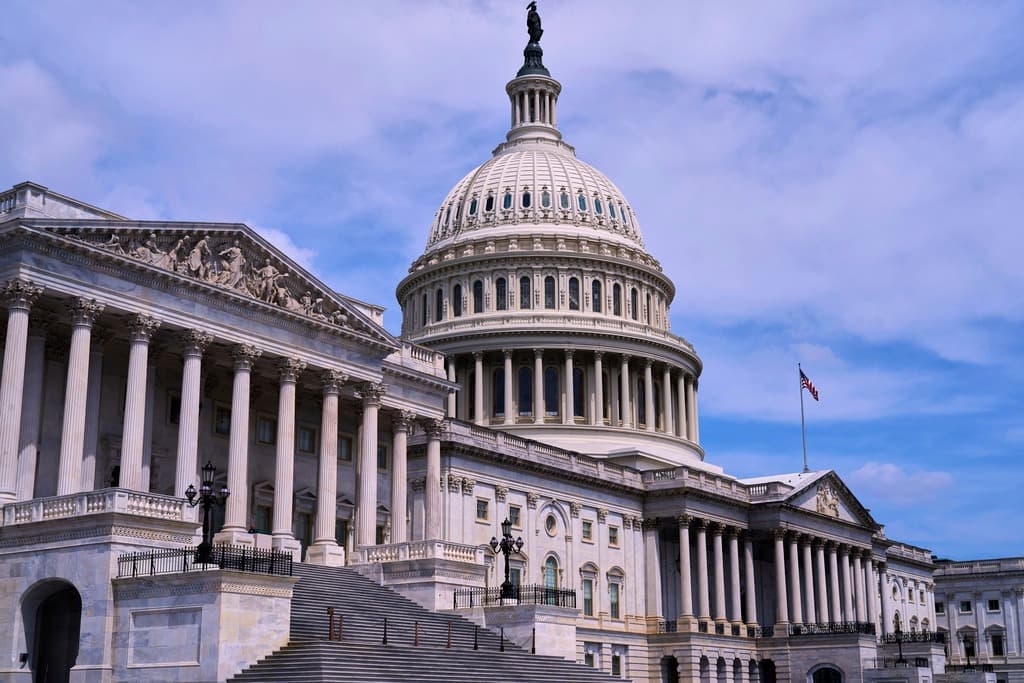
After spending more than a month away from the U.S. Capitol, Congress is back. And the work has piled up while both chambers were gone.
The issue that will likely take up most of the oxygen on the Hill in September is funding the government.
With just over three legislative weeks before the government runs out of money, the Senate left for the August recess having passed only three of the 12 needed appropriations bills, while the House had only passed two. The chambers are using different baseline numbers, so that means an agreement will need to be worked out between the House and the Senate numbers for full year funding or a short-term patch.
“The government funding issue must be resolved in a bipartisan way. That is the only viable path forward,” wrote Democratic leaders Sen. Chuck Schumer and Rep. Hakeem Jeffries to Republican Leaders Sen. John Thune and House Speaker Mike Johnson. The Democrats called for an immediate four corners meeting, where leaders of both chambers meet. “It is past time you reveal your plans to meet the needs of the American people.”
“I am optimistic as to how we can work together to get more funding through in a timely manner,” said GOP Rep. Jeff Crank from the 5th Congressional District centered in Colorado Springs.
But not everyone shares that optimism, especially after the White House last week went around Congress and cut $5 billion in foreign aid through a “pocket rescission.”
“I’m deeply concerned that we are more likely facing a government shutdown than previous years, which means that thousands of workers in Colorado will be unable to do their job and will have to go without a paycheck while trying to provide for their family,” said Democratic Rep. Brittany Pettersen. “Even if they pass a continuing resolution and fund the government on the previous years’ budget, this still has significant consequences on our ability to address urgent needs as costs continue to rise and critical projects will be left another year without being funded.”
Democratic Rep. Jason Crow said the GOP has not been willing to negotiate a bipartisan budget, but for most of the year was focused on their partisan reconciliation bill. “A government shutdown would hurt our economy, military readiness, and servicemembers. Republicans control the House, the Senate, and the White House—if the government shuts down, Republicans will be responsible.”
While the House only requires a simple majority to pass funding bills, the Senate will require 60 votes, meaning Republicans will need to get Democrats on board.
“Any funding bill or CR is going to require bipartisan negotiation. It’s up to Republicans and Democrats to work towards a deal that will pass,” Democratic Sen. John Hickenlooper said in an email, “and we’ll fight hard for the inclusion of Colorado priorities and funding for our communities.”
Those priorities include funding requests made by Colorado lawmakers through earmarks. Earlier this year when Congress passed a continuing resolution to fund the government through the end of September, earmark requests were not included. In the budget leading up to an election year, some House Republicans are reportedly demanding they be included in any plan to avert an October 1 shutdown.
For the first time since earmarks were reinstated, all of Colorado’s members of Congress have requested them as part of the FY2026 government funding process.
Democratic Sen. Michael Bennet agreed that any government funding package would need to ensure that the state’s priorities are included, “and that the Senate provides urgent support to Colorado’s wildland firefighters and rural communities facing this summer’s devastating wildfire season.”
One policy and spending issue that has gotten bipartisan support for more than 60 years is the National Defense Authorization Act, the annual defense policy bill. The Senate is expected to start work on passage of its version of the bill this week and the House will work on its bill next week.
Both Crank and Crow serve on the House Armed Services committee and are hopeful it will pass. It passed the committee with “a strong bipartisan vote,” Crow noted.
Rank and File lawmakers press other issues
Whether House Republican leaders want to or not, some rank and file members will be pushing for votes on two issues when they return.
GOP Rep Anna Paulina Luna of Florida filed a resolution to force a vote on a bill from fellow GOP Rep. Tim Burchett of Tennessee to ban members of Congress, their spouses and dependent children from trading and owning individual stocks.
Colorado lawmakers have signed onto a different bill with that same goal. Reps. Crow, Pettersen, Joe Neguse, Jeff Hurd and Lauren Boebert are co-sponsors of the bipartisan TRUST in Congress bill, that would require Congress members, their spouses and dependent children to put investments in a qualified blind trust.
“We need real accountability and a clear, enforceable ban. If leadership won’t bring that bill up for a vote, I’m open to considering other efforts that achieve the same goal, including the Burchett bill if it comes to the floor,” said Pettersen.
“Members of Congress and their families should be banned from trading individual stocks. Full stop. Any step to restore the public’s trust in government is long overdue, and if Congressman Burchett’s bill effectively bans congressional stock trading then I’ll support it,” added Crow.
Crank said he’s “open to considering proposals that would further regulate stock trading for members of Congress.”
Another sensitive issue, especially for Republicans, is a push to have a vote on releasing all Department of Justice files related to Jeffrey Epstein. Johnson sent the chamber on recess early to avoid a vote on the issue, but it will be waiting when they return.
The bipartisan duo of Reps. Thomas Massie and Ro Khanna have filed a discharge petition to force a vote on their Epstein resolution. The two will have a press conference with some of Epstein’s victims tomorrow.
After the Justice Department handed over thousands of documents to Congress, Johnson said Friday a vote would not be needed, but that if necessary, “we will.”
Colorado’s Democrats have been pushing for the files to be released, as have some Republicans.
“We need to vote to release the Epstein files, that issue is not going away. The American people deserve transparency,” said Crow.
“I believe the American people deserve transparency into Epstein’s dealings, and I support the release of relevant documents that shed light on what occurred, while protecting the identity of the victims,” said Crank.
Senate rules complicate appointments
On the other side of the Capitol, one pressing issue will be whether Republicans change rules to deal with nominations faster.
Before the chamber left for the August recess, tensions were boiling over as Democrats forced time to be spent on confirmation votes. During the terms of George H.W. Bush and Bill Clinton about 98 percent of their nominees were confirmed through voice votes or unanimous consent agreements. During Trump’s first term and Joe Biden’s term, that number dropped to 65 percent and 57 percent.
Democrats have not agreed to a voice vote or unanimous consent on any civilian Trump nominee this year.
In a Wall Street Journal op-ed Senate Majority Whip John Barrasso of Wyoming wrote, “confirming even the most routine nominees is now a bitter fight. It is time to change Senate confirmation rules.”
The Senate’s top Republican and Democrat and Trump came close to a deal “several different times” but were unable to close it out.
Additionally, Health and Human Services Secretary Robert F. Kennedy is due to testify in front of the Senate Finance committee on Sept 4 on the President’s Health Care agenda, but he’ll likely face several questions over his ouster of the head of the Centers for Disease Control and Prevention. Bennet is on that committee.
Another issue that Colorado members are expected to push is health care and extending a subsidy for people to buy health insurance on the marketplace. The extended tax credit is due to expire at the end of the year, but already it’s being felt in Colorado, with insurers expecting to increase prices.
“Over 300,000 Coloradans would see their health insurance costs skyrocket if Republicans in Congress let the Expanded Premium Tax Credits expire. We cannot allow that to happen,” said Bennet.
“This is an opportunity to work together to stop these cuts and extend provisions that keep health care costs low for working families,” Hickenlooper added.
It’s also a priority for many House Democrats. “We only have a few months before ACA enhanced premium tax credits expire which is going to cause health care costs to skyrocket. It’s imperative that we extend these tax credits before people are pushed even further underwater by Trump’s reckless agenda,” said Pettersen.
Also waiting in the wings in the Senate is a bipartisan Russia sanctions bill that has over 80 co-sponsors, including Bennet and Hickenlooper. The Senate left town without bringing it to the floor for a vote, with Republican leaders opting to give Trump a chance to get a deal.
But no deal has emerged and a recent Russian strike on Kyiv that killed 23 people was condemned by leaders on both sides of the aisle.
“If Russia stalls peace negotiations while Ukrainians are fighting for their very existence, Russia should be sanctioned: plain and simple. The bipartisan sanctions bill should absolutely be brought to the Senate floor, where I will vote YES,” Hickenlooper said.
Crow added that Congress needs to hold Russia accountable for its war on Ukraine. “Passing a sanctions bill would send a strong message, but we need Republicans who support this type of legislation to push the President to make good use of those authorities and actually enforce them,” he said.








